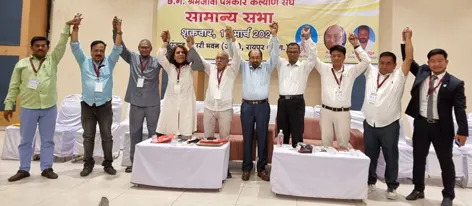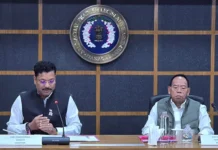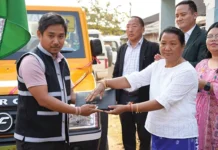Staff Reporter
RAIPUR, 17 Mar: Geetartha Pathak and Sabina Inderjit were reelected as the Indian Journalists Union’s (IJU) president and secretary-general, respectively, during the IJU’S 10th plenary in Raipur, Chattisgarh, on Friday.
Pathak and Inderjit were reelected unopposed as the heads of the country’s largest journalists’ union.
The IJU president in his opening remarks said that “journalists, media, and journalism itself have never faced such a formidable challenge as we have been experiencing over the last eight years.”
“IJU is relentlessly fighting for the rights of journalists, freedom of media, better working conditions for media persons and freedom of speech for all the citizens of the country since its inception,” Pathak said.
Stating that the “divisive trend in journalists’ unions is an area of great concern,” he called for unity among the journalists of the country for promotion of free press.
“The IJU is spreading from Kashmir to Kanyakumari, and from the Northeast to the Andaman & Nicobar Islands,” he added.
Pathak said also that “journalism, being a vital pillar of democracy, needs more support from the respective state governments and administrations.”
“Although a few state governments have cone up with medical welfare schemes for journalists, many states have not taken any such initiative. Since journalism is a profession with risks to lives and health, the government and the media employers should put in place compulsory insurance policies for all journalists,” he added.
Inderjit in her address gave a clarion call to the IJU members and the states’ leaderships to “gear up and change their outlook as unions to meet new challenges.”
“Media industry is also going through dramatic changes. We are in the digital age now, surpassing print and electronic media, and therefore we need to gear up and change our outlook as unions to meet new challenges,” she added.
Inderjit, who is also the vice president of the International Federation Journalists, expressed concern over the growing attacks on journalists.
“Governments, both state and central, used the pandemic to gag the media from reporting ground situation. The DMA and the Epidemic Act were brazenly misused to clamp down on independent reportage. There is a clampdown on social media too with a skewed digital draft policy, which has been challenged in courts. There’s a chilling effect with FIRs filed or journalists being jailed for their writings and posts by using draconian Acts like NSA, UAPA, etc,” she added.
Stating that Indian media is going through its trials and tribulations “like those in other countries under nationalist governments,” she exhorted the journalists to fight the dangerous trend.
Earlier, the two-day national-level plenary was inaugurated by Chattisgarh Chief Minister Bupesh Baghel.
Addressing the inaugural session, Baghel said, “Chattisgarh cabinet today gave approval to the draft bill on the law prohibiting attacks on journalists (Journalists Protection Act).”
The decision was taken during a state cabinet meeting on Friday, which was chaired by the CM himself.
“The cabinet has given its nod to a bill concerned with the prevention of violence against journalists, and the same will be placed in the state assembly for its enactment,” he said.
He urged the four pillars of democracy – the legislature, executive, judiciary and the media – to “complement each other to strengthen democracy.”
“If there is an imbalance among any of these pillars, especially the media, then it will have an adverse impact on society,” he said.
Around 200 participants from 13 states are attending the two-day plenary.
Arunachal Pradesh Union of Working Journalists President Amar Sangno, IJU NEC member Taya Bagang, and senior journalist Mukul Pathak also attended the inaugural event.



